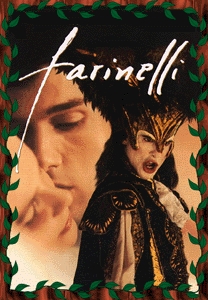Farinelli (film)
| Farinelli | |
|---|---|

Theatrical release poster
|
|
| Directed by | Gérard Corbiau |
| Produced by | Véra Belmont |
| Written by |
Marcel Beaulieu Andrée Corbiau Gérard Corbiau |
| Starring |
Stefano Dionisi Enrico Lo Verso Elsa Zylberstein |
| Music by |
Johann Adolf Hasse (composer: additional music) Nicola Porpora (composer: additional music) Ewa Malas-Godlewska (singer) Derek Lee Ragin (singer) |
| Cinematography | Walther van den Ende |
| Edited by | Joëlle Hache |
|
Production
company |
Stéphan Films
MG Italian International Film K2 SA Alinea Films Union Generale Cinematographique Canal+ France 2 Cinéma Studio Image Mediaset RTL-TVI Filmstiftung Nordrhein-Westfalen |
| Distributed by | Sony Pictures Classics (Region 1 DVD) |
|
Release date
|
|
|
Running time
|
111 minutes |
| Country | Italy Belgium France |
| Language |
Italian French |
| Budget | $8.9 million |
| Box office | $11.5 million |
Farinelli is a 1994 internationally co-produced biographical drama film directed by Gérard Corbiau and starring Stefano Dionisi, Enrico Lo Verso, Elsa Zylberstein and Jeroen Krabbé. It centers on the life and career of the 18th-century Italian opera singer Carlo Broschi, known as Farinelli, considered the greatest castrato singer of all time; as well as his relationship with his brother, composer Riccardo Broschi.
The prologue begins with Carlo Broschi, the famous castrato "Farinelli", reminiscing about his childhood as a singer in the church choir. A newly-castrated boy runs in and warns Carlo to stop singing, warning that his voice will result in castration, before leaping to his death. Carlo is so traumatised by this that he is then unwilling to sing when told to by his voice teacher, Nicola Porpora later during his voice lessons. He runs off crying and asking why this the castrato had to die. Carlo's father runs after him, and after comforting him, makes him promise that he will never refuse his voice to his brother Riccardo ever again.
The film opens in Madrid, Spain, at the palace of King Philip V. Riccardo Broschi (Enrico Lo Verso) demands to see his younger brother, the Italian castrato Carlo Broschi (Stefano Dionisi)—better known by his nickname, "Farinelli". Carlo refuses.
The rest of the film is told in flashback. Eighteen years earlier, Carlo and Riccardo watched as an itinerant trumpet player humiliated a young castrato. Angered, Carlo humiliates the trumpeter in turn. The crowd gives Carlo the nickname "Farinelli". When Carlo attempts to have sex with a local woman, Riccardo interrupts, pushing Carlo aside and making love to the girl himself. Meanwhile, George Frideric Handel (Jeroen Krabbé) has heard Farinelli sing from his carriage. He asks Carlo to come to England and perform, but Riccardo demands to be included. Handel sneers at Riccardo as a hack, and humiliates Carlo as a freak, leaving Carlo despondent and Riccardo angry.
...
Wikipedia
